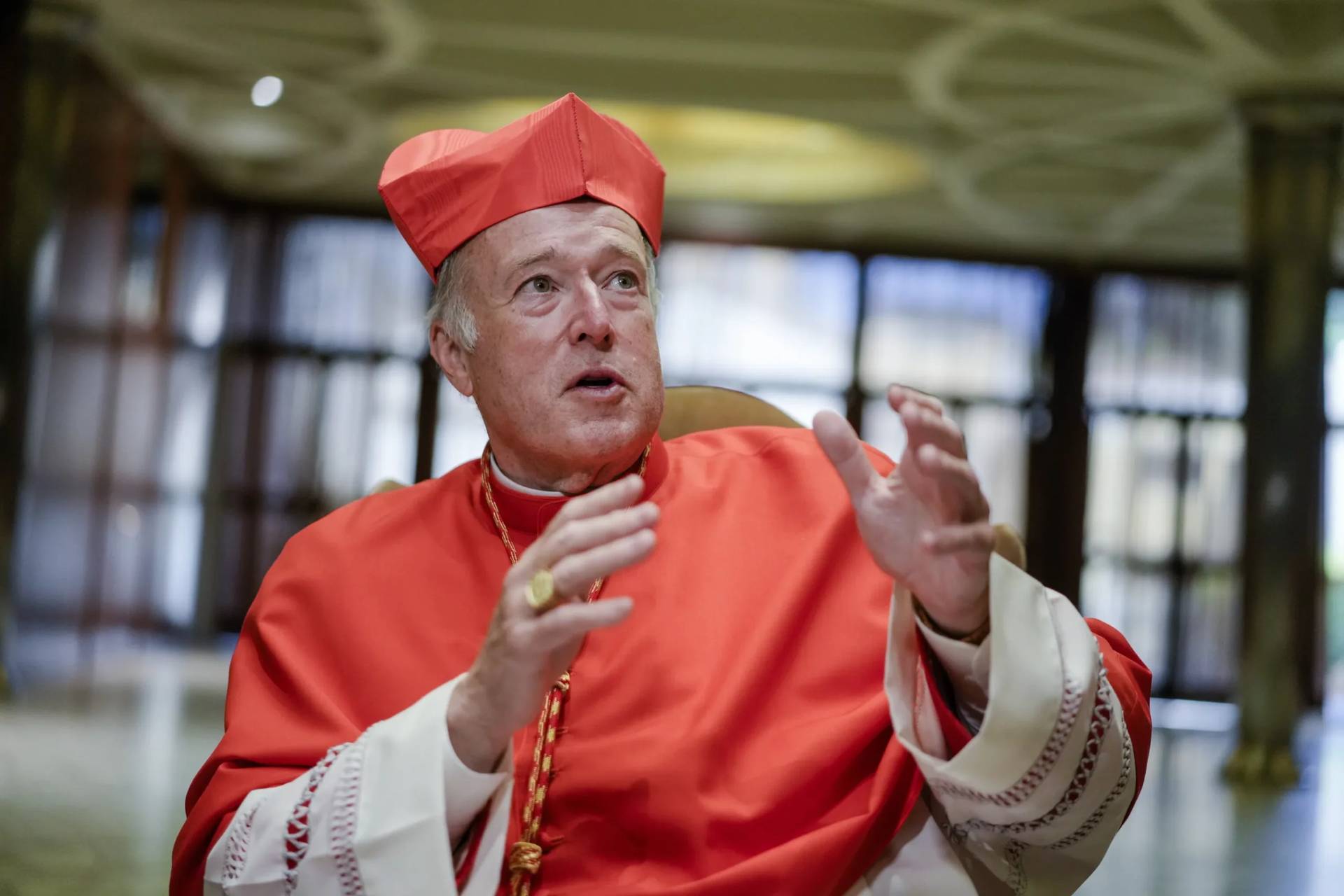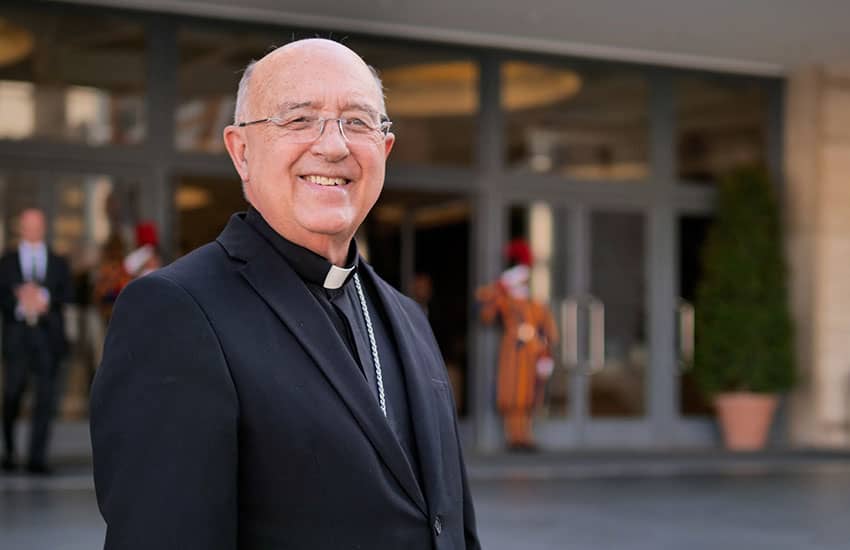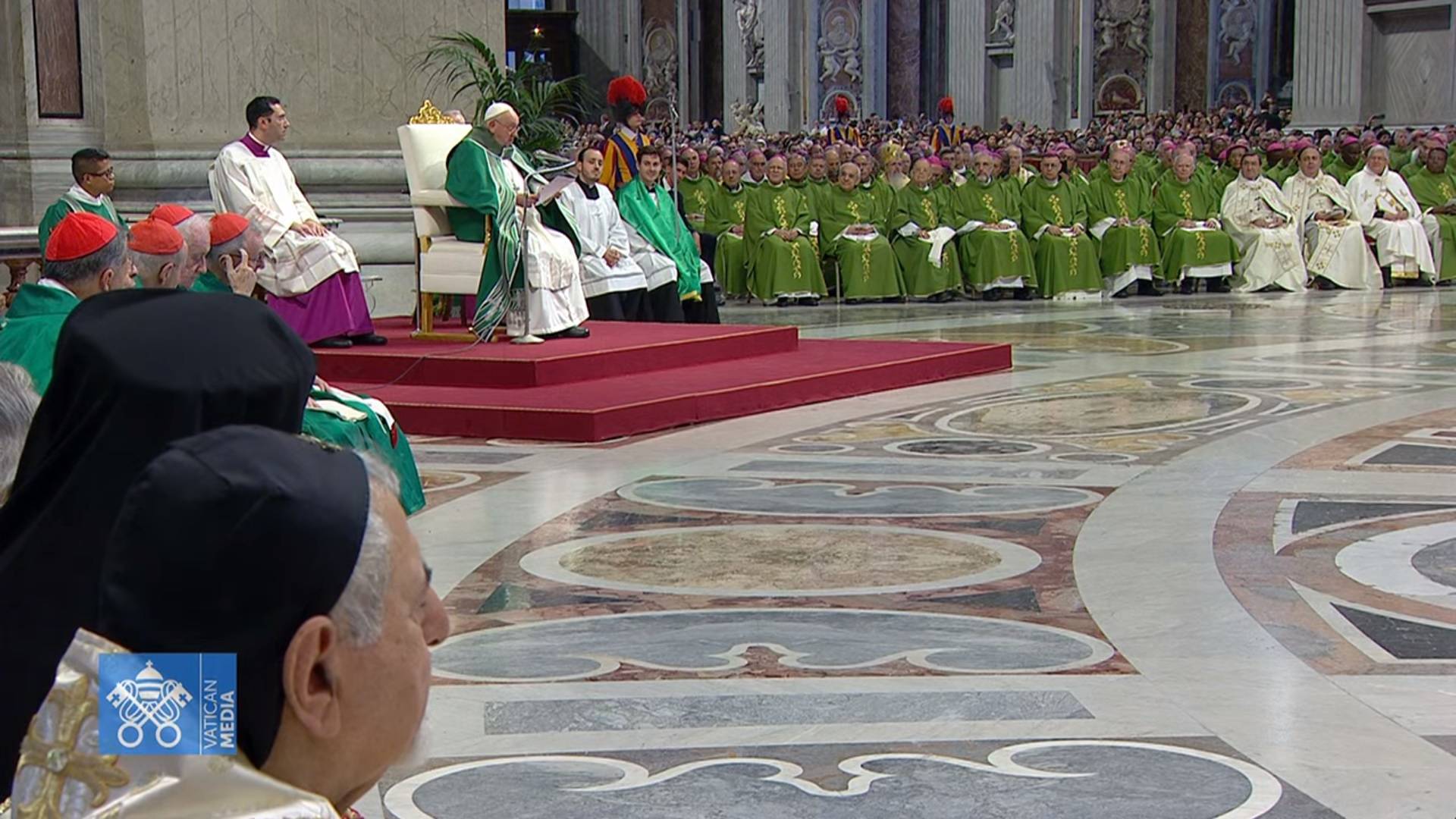ROME – Responding to a group of five conservative cardinals who posed critical questions about his upcoming Synod of Bishops on synodality, Pope Francis largely upheld the Church’s ban on women priests, while suggesting the doctrine can still be studied, but signaled openness to giving blessings to same-sex couples provided that doing so is not confused with the sacrament of marriage.
The pope issued his replies in July, but they were made public only Monday.
On Friday, the five conservative cardinals published what are technically known as dubia, or “doubts,” which they said they had submitted to the pontiff over the summer, and which focus on women’s ordination, the blessing of same-sex unions and the authority of the synod to issue binding teaching.
In their announcement, the cardinals said they had submitted the questions to the pope July 10 and received a response the next day, on July 11. However, since Pope Francis did not respond in the traditional “yes or no” formula, they reworded the dubia and submitted them again Aug. 21.
After receiving no response, the cardinals made the dubia public on the eve of the Oct. 4-29 Synod of Bishops on Synodality.
RELATED: Five conservative cardinals submit new dubia to Pope ahead of synod
A Sept. 25 letter to Pope Francis from new Cardinal Víctor Manuel Fernández, prefect of Dicastery for the Doctrine of the Faith, was published Monday which included the pope’s responses to the original set of dubia presented in July.
On whether the practice of blessing same-sex unions is in keeping with Catholic revelation and the Church’s magisterium, Francis said “the Church has a very clear concept on marriage: An exclusive, stable and indissoluble union between a man and a woman, naturally open to begetting children.”
“Only this union is called ‘marriage.’ Other forms of union are only realized ‘in a partial and analogous way’, which is why they cannot strictly be called ‘marriage,’” the pope said.
Sacramental marriage “is much more than a mere ‘ideal,’” he said, adding this is why the Church “avoids every type of rite or sacrament that can contradict this conviction and imply that something is recognized as marriage which is not.”
However, Pope Francis stressed the need for compassion in the Church’s pastoral care of homosexual individuals, and signaled an openness to blessing same-sex unions on a case-by-case basis.
“In dealing with people we must not lose pastoral charity, which must pass through all of our decisions and attitudes,” he said, saying “the defense of the objective truth is not the only expression of this charity, which is also made of kindness, patience, understanding, tenderness, and encouragement.”
“Consequently, we cannot become judges who only reject, deny and exclude,” he said.
For this reason, the pope said, “pastoral prudence must adequately discern if there are forms of blessing, requested by one or various people, which do not convey a wrong concept of marriage.”
This, he said, is because “when we ask for a blessing, we are expressing a request for help from God, a prayer to be able to live better, a trust in a Father who can help us to live better.”
However, he cautioned against making any norms to this effect, saying, “Decisions which, in certain circumstances may be part of pastoral prudence, do not necessarily have to become a norm.”
In what could be interpreted as a message to the German Church’s controversial “Synodal Path,” he said “it is not appropriate for a Diocese, an Episcopal Conference or any other ecclesial structure to constantly and officially enable procedures or rites for every type of issue, since everything ‘that is part of a practical discernment in the face of a particular situation cannot be elevated at the level of a norm,’ because this ‘would give rise to unbearable casuistry.’”
Canon Law, the pope said, “must not and cannot cover everything, and not even the Episcopal Conferences with their varied documents and protocols can claim to do so, because the life of the Church flows through many channels in addition to the normative ones.”
On whether women are able to be ordained priests, Pope Francis responded quoting the Second Vatican Council document Lumen Gentium, which states, “The common priesthood of the faithful and the ministerial priesthood differ essentially.”
“It is not appropriate to support a difference in degree that implies considering the common priesthood of the faithful as something of ‘second category’ or of lesser value (‘a lower degree’),” he said, insisting that “both forms of priesthood illuminate and support one another.
As he has in the past, Francis referred to St. Pope John Paul II’s position “definitively” affirming “the impossibility of conferring priestly ordination on women.”
However, in saying this, John Paul “was in no way denigrating women and conferring supreme power on men,” he said, saying John Paul spoke of priestly power “in the context of function, not of dignity and sanctity.”
“These are words that we have not sufficiently accepted,” Francis said, and pointed to further remarks from John Paul II stating that priestly tasks “do not give rise to the superiority of some over others,” and that “if the priestly function is ‘hierarchical,’ it must not be understood as a form of domination, but ‘is totally ordered to the sanctity of the members of Christ.’”
Pope Francis insisted that “if is not understood and the practical consequences of these distinctions are not drawn, it will be difficult to accept that the priesthood is reserved only for men and we will not be able to recognize the rights of women or the need for them to participate, in various ways, in the leadership of the Church.”
On whether divine revelation ought to be reinterpreted on the basis of cultural changes, the pope said, the answer “depends on the meaning you give to the word ‘reinterpret.’ If it is understood as ‘interpret better,’” he said, “the expression is valid.”
“Although it is true that divine revelation is immutable and always binding, the Church must be humble and recognize that she never exhausts her unfathomable wealth and needs to grow in her understanding,” he said, saying the Church’s understanding of herself and its magisterium “matures” over time.
Therefore, “cultural changes and new historical challenges do not modify revelation, but they can stimulate us to make more explicit some aspects of its overflowing wealth that always offers more,” he said.
On whether synodality is a “constitutive dimension of the Church,” meaning the church by its nature is synodal, Pope Francis said that “the Church is a ‘mystery of missionary communion,’ but this communion is not only affective or ethereal, but rather necessarily implies real participation.”
“Both the hierarchy, and the entire People of God in different ways and at different levels can make their voice heard and feel like part of the Church’s journey. In this sense we can say that yes, synodality, as style and dynamism, is an essential dimension of the life of the Church,” he said.
He cautioned against any attempt to “sacralize or impose a certain synodal methodology that pleases one group, transforming it into a norm and an obligatory path for everyone, because this would only lead to ‘freezing’ the synodal path” by ignoring the diversity of local churches.
On whether repentance is a necessary condition for a penitent to receive absolution in the sacrament of confession, given his repeated insistence that “forgiveness is a human right,” Francis said the answer is yes.
“Repentance is necessary for the validity of sacramental absolution, and implies the intention not to sin,” however, he insisted that “there is no mathematics here, and I must remind once again that the confessional is not a customs office.”
“We are not masters, but humble administrators of the sacraments that nourish the faithful, because these gifts of the Lord, more than relics to be preserved, are aides of the Holy Spirit for people’s lives,” he said, noting that there are many ways to express repentance.
For people with “very wounded self-esteem,” admitting guilt or wrongdoing “is a cruel torture, but the mere act of approaching confession is a symbolic expression of repentance and the search for divine help,” he said.
“I also want to remember that ‘sometimes it costs us a lot to give space to the unconditional love of God in our pastoral work’, but we must learn,” he said, saying, “we must not ask the faithful for correction resolutions that are too precise and certain, which in the end, end up being abstract or even narcissistic.”
“Even the predictability of a new fall ‘does not prejudice the authenticity of the resolution,” he said, quoting a 1996 letter from John Paul II to the late American Cardinal William Baum.
Follow Elise Ann Allen on Twitter: @eliseannallen













